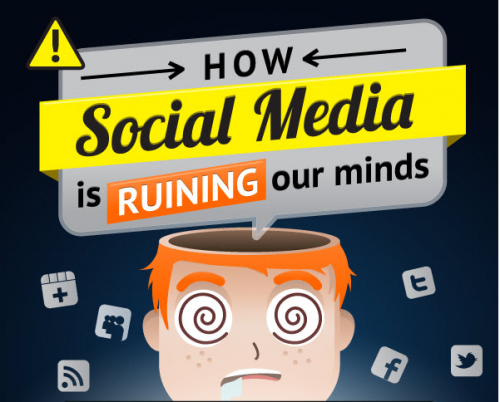
Social media has rapidly burst into our lives and is taking an increasing place in it. Such networks as Facebook*, Twitter, Google+ are becoming our main source of news, a means of communication and self-expression. At the same time, social media is changing not only the life around us, but also ourselves. Scientists have studied the impact of new media on our ability to learn and assimilate information, the ability to multitask and focus. You can see some of the data obtained on the presented infographic.

Surprisingly, social media affects a variety of aspects of our lives. First of all, the attention of scientists was attracted by the skills of multitasking, social interaction and the ability to focus.
You have already heard many times about the increased pace of life, which is largely due to the instant availability of any information we need. Our consciousness is constantly changing and adapting to the environment in accordance with the experience gained. It would be a big mistake to think that the many hours we spend online every day do not affect our brain in any way.
One of the main symptoms that manifests itself in almost all users is attention deficit. The average length of time during which we can hold attention is currently only 5 seconds. Ten years ago, this value was 12 minutes.
The effect of «short attention » is expressed in the fact that 25% of people forget the names and details concerning close friends and even relatives. 7% of people may even forget their own birthday from time to time. In the UK, more than 1.6 billion euros worth of damage was caused last year due to reasons related to the lack of concentration.
The inability to concentrate on one task leads to the fact that every time we switch to a new task, the brain has to rebuild itself. This feature is detrimental to performance, but the whole Internet is built on this. The average office worker checks the mail 30-40 times within an hour. 500,000 people use Twitter daily. People spend 700 billion minutes on Facebook every month.
In addition to changes in consciousness and behavior, social networks are addictive on a chemical level. When using social networks, the same hormones are released that are seen in people communicating with friends and relatives in real life. Perhaps because of this hormonal addiction, many users who do not have more than 24 hours of access to the network experience phenomena such as phantom phone calls, the desire to check updates in their account even without an Internet connection, and so on.
The influence of social networks on the human brain is not yet a well-researched area. However, it is not necessary to wait for comprehensive scientific research here, it is enough just to observe yourself. How dependent are you on your favorite social girl? Does it replace real communication for you, or vice versa, helps you make new acquaintances? What is it for you — good or evil?
Instagram Facebook and social networks owned by Meta Platforms Inc. are prohibited from operating in the territory of the Russian Federation.*